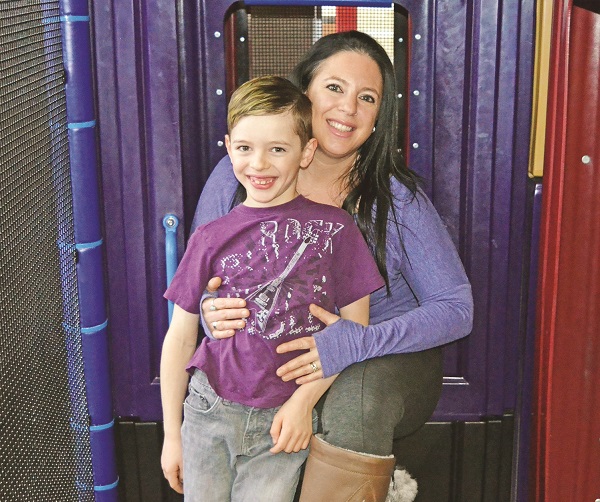General News » News
Be your child’s advocate in health care: mom
January 24, 2018 · 0 Comments

By Brock Weir
Laura Schaffer was visiting a cottage along the French River when, in that relatively remote Ontario community, her son’s face froze.
She and her husband had no idea what was happening to their son, Erik Ront.
After calling an ambulance, the young buy was taken to hospital in Sudbury. A three day stint in the hospital was ultimately the start of a painful three year journey for the Aurora family as they began navigating through the complex world of epilepsy.
“Because we were in an isolated hospital, they were able to do an MRI on Erik which they wouldn’t be able to do as quick here and they ruled out lesions, tumours, infections, and there was no underlying reason for him to be having these seizures,” shares Laura.
Once the diagnosis had been reached, trials for medications began in earnest, often affecting Erik’s behaviour. He could sometimes hit, punch and fought like never before and, on one medication, temporarily lost his speech.
A novice as a mom to a son with epilepsy, Laura thought these behavioural changes were symptoms of the disorder progressing and not the medication.
“It was really scary,” she says, noting that, as a mom, she went from the comfort of having her child relatively independent to play with his friends and change his clothes, to a world where a seizure could happen at any moment. “10 minutes after he had a seizure, I thought I would be in a safety zone to let him run upstairs and get dressed, but the next thing I know I see a body just fall from the stairs and hit the hardwood floor. That was my realization of when I couldn’t let him go on stairs alone, I couldn’t let him climb on a playground, couldn’t sit on a swing by himself. It was like having an infant again in a five year old child who just wants to run and be active. You have to limit your child but then you hear all the doctors saying, ‘Just let him live a normal life.’ It’s easier said than done.”
As much as Erik might have missed being able to do the simple tasks on his own, his mother too was feeling more alone than ever, not knowing where to turn. But she eventually made a connection with Epilepsy York Region, the community organization which serves as a resource to parents and families navigating these waters every single day.
Ms. Schaffer is sharing their story to raise awareness not only for the organization, but also for their upcoming fundraiser at Tuesday, February 13 when Wimpy’s Diner at Yonge and Golf Links will be flipping one dollar pancakes to mark Shrove Tuesday and raise funds for the organization.
“I have been a member since September 2016 when Erik started Grade 1,” says Laura, adding around this time she received a call from Erik’s teacher suspecting he had had a seizure, but not fully aware of the signs. “I realised they are not really educated on what a seizure looks like. I contacted Epilepsy York Region and said I needed their help; they came into the school, met with the teacher and the class. They basically empower people and, since then, I have been active helping out as much as I can.”
Empowerment, however, was not a feeling out of reach for Laura early on in Erik’s journey, however.
After a referral from her Stouffville neurologist, Dr. Pamela Cooper, in 2015, Erik entered the Epilepsy Monitoring Unit at SickKids Hospital for five days of tests. Over that time, they found in a 24 hour period he had no less than 21 seizures – and was told the tests were complete and to go home.
“What do you mean I can go home,” says Laura of her response to the team. “I have a kid on one medication that isn’t working, he’s not himself and you want me to go home and just live a normal life? I couldn’t go home. We needed to be there and have more tests. I knew I was going to be back there one day, so why don’t we start doing this now so we don’t have to come back? They agreed and kept us there a few more days, started a new medication as well.”
Eventually, after further tests and referrals, they hit upon a perfect formula of medication that has, despite continued abnormal activity in his brain, kept Erik seizure free for nearly two years so far.
“You have to really advocate for your children in the sense of knowing your child,” says Laura. “Erik is maybe 90 per cent himself, which I will take given how he was at one point, but he has grown up over the last two years. Just because your doctor says go home, you’re done, it doesn’t mean it is the end of the line for you and I really want people to learn that.
“I know you feel alone and you’re the only family that is going through this, but seek help, ask your doctor, ask your school if there are any other families within your schools because there is so much help out there but unless you look for it you can’t find it. It will not come to you.”











